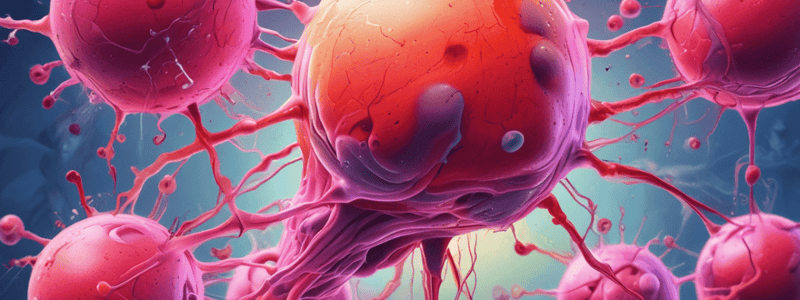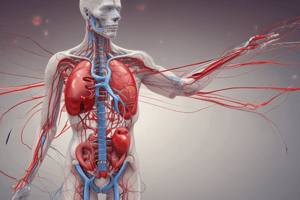Podcast
Questions and Answers
What is the primary cause of hypoperfusion?
What is the primary cause of hypoperfusion?
- Widespread infection leading to septic shock
- Failure of multiple organ systems
- Increased cardiac output and heart rate
- Decreased delivery of oxygen and nutrients to tissues (correct)
Which of the following is NOT a physiological response to hypoperfusion?
Which of the following is NOT a physiological response to hypoperfusion?
- Increased cardiac contraction strength
- Vasodilation (correct)
- Increased systemic vascular resistance
- Increased heart rate
What is the primary characteristic of shock?
What is the primary characteristic of shock?
- Increased cardiac output
- Adequate perfusion of vital organs
- Decreased heart rate
- Inadequate oxygen and nutrient delivery to cells (correct)
Which type of shock is typically caused by spinal cord injuries?
Which type of shock is typically caused by spinal cord injuries?
What is the primary characteristic of Multiple Organ Dysfunction Syndrome (MODS)?
What is the primary characteristic of Multiple Organ Dysfunction Syndrome (MODS)?
Which of the following is NOT a component of the immune system's defense mechanisms?
Which of the following is NOT a component of the immune system's defense mechanisms?
Study Notes
- Perfusion is the delivery of oxygen and nutrients by the circulatory system, and hypoperfusion occurs when tissue perfusion decreases below normal levels.
- In response to hypoperfusion, the body releases catecholamines like epinephrine, leading to increased cardiac contraction strength, heart rate, vasoconstriction, and systemic vascular resistance.
- Hypoperfusion can lead to shock, an abnormal state associated with inadequate oxygen and nutrient delivery to cells, resulting in impaired cellular metabolism and inadequate perfusion of vital organs.
- Different types of shock include central shock (cardiogenic and obstructive) and peripheral shock (hypovolemic and distributive).
- Septic shock results from widespread infection, while neurogenic shock usually stems from spinal cord injuries.
- Shock is characterized by reduced cardiac output, circulatory insufficiency, rapid heartbeat, and evaluation of peripheral pulses and organ perfusion is essential for diagnosis.
- Multiple Organ Dysfunction Syndrome (MODS) is the progressive failure of two or more organ systems in critically ill patients, with varied mortality rates based on underlying issues.
- The immune system's defense mechanisms include anatomic barriers like skin and immune responses against foreign substances.
- Immune responses involve natural or native immunity and passively acquired immunity through preformed antibodies.
- Inflammatory reactions and immune responses are independent processes often occurring simultaneously due to factors like infection and injury.
Studying That Suits You
Use AI to generate personalized quizzes and flashcards to suit your learning preferences.
Description
Test your knowledge on topics related to perfusion, shock, and immune responses. Learn about hypoperfusion, types of shock, shock characteristics, and immune defense mechanisms.




